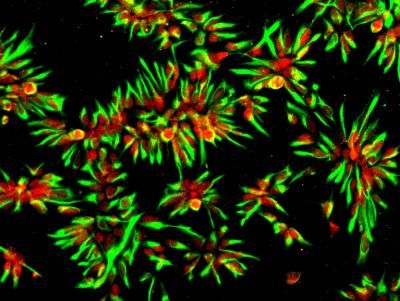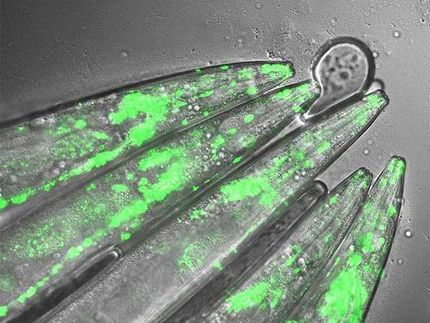Gladstone scientists reprogram skin cells into brain cells
Innovative technique lays groundwork for novel stem cell therapies
Scientists at the Gladstone Institutes have for the first time transformed skin cells — with a single genetic factor — into cells that develop on their own into an interconnected, functional network of brain cells. The research offers new hope in the fight against many neurological conditions because scientists expect that such a transformation — or reprogramming — of cells may lead to better models for testing drugs for devastating neurodegenerative conditions such as Alzheimer's disease.
This research comes at a time of renewed focus on Alzheimer's disease, which currently afflicts 5.4 million people in the United States alone—a figure expected to nearly triple by 2050. Yet there are no approved medications to prevent or reverse the progression of this debilitating disease.
In findings appearing in Cell Stem Cell, researchers in the laboratory of Gladstone Investigator Yadong Huang, MD, PhD, describe how they transferred a single gene called Sox2 into both mouse and human skin cells. Within days the skin cells transformed into early-stage brain stem cells, also called induced neural stem cells (iNSCs). These iNSCs began to self-renew, soon maturing into neurons capable of transmitting electrical signals. Within a month, the neurons had developed into neural networks.
"Many drug candidates — especially those developed for neurodegenerative diseases — fail in clinical trials because current models don't accurately predict the drug's effects on the human brain," said Dr. Huang, who is also an associate professor of neurology at the University of California, San Francisco (UCSF), with which Gladstone is affiliated. "Human neurons — derived from reengineered skin cells — could help assess the efficacy and safety of these drugs, thereby reducing risks and resources associated with human trials."
Dr. Huang's findings build on the work of other Gladstone scientists, starting with Gladstone Investigator, Shinya Yamanaka, MD, PhD. In 2007, Dr. Yamanaka used four genetic factors to turn adult human skin cells into cells that act like embryonic stem cells — called induced pluripotent stem cells.
Also known as iPS cells, these cells can become virtually any cell type in the human body — just like embryonic stem cells. Then last year, Gladstone Senior Investigator Sheng Ding, PhD, announced that he had used a combination of small molecules and genetic factors to transform skin cells directly into neural stem cells. Today, Dr. Huang takes a new tack by using one genetic factor — Sox2 — to directly reprogram one cell type into another without reverting to the pluripotent state.
Avoiding the pluripotent state as Drs. Ding and Huang have done is one approach to avoiding the potential danger that "rogue" iPS cells might develop into a tumor if used to replace or repair damaged organs or tissue.
"We wanted to see whether these newly generated neurons could result in tumor growth after transplanting them into mouse brains," said Karen Ring, UCSF Biomedical Sciences graduate student and the paper's lead author. "Instead we saw the reprogrammed cells integrate into the mouse's brain — and not a single tumor developed."
This research has also revealed the precise role of Sox2 as a master regulator that controls the identity of neural stem cells. In the future, Dr. Huang and his team hope to identify similar regulators that guide the development of specific neural progenitors and subtypes of neurons in the brain.
"If we can pinpoint which genes control the development of each neuron type, we can generate them in the petri dish from a single sample of human skin cells," said Dr. Huang. "We could then test drugs that affect different neuron types — such as those involved in Parkinson's disease — helping us to put drug development for neurodegenerative diseases on the fast track.
Other news from the department science

Get the life science industry in your inbox
By submitting this form you agree that LUMITOS AG will send you the newsletter(s) selected above by email. Your data will not be passed on to third parties. Your data will be stored and processed in accordance with our data protection regulations. LUMITOS may contact you by email for the purpose of advertising or market and opinion surveys. You can revoke your consent at any time without giving reasons to LUMITOS AG, Ernst-Augustin-Str. 2, 12489 Berlin, Germany or by e-mail at revoke@lumitos.com with effect for the future. In addition, each email contains a link to unsubscribe from the corresponding newsletter.
Most read news
More news from our other portals
Last viewed contents
Helen_Keller_International
Category:French_marine_biologists
SeraCare Life Sciences sharpens focus on diagnostics industry

Disarming HIV with a "pop"
Généthon - Évry, France
Circassia Extends its Clinical-Stage Portfolio With Phase II Trials of T-Cell Vaccines Against House Dust Mite and Cat Allergies
Biotec Pharmacon reports on neuroblastoma study
Merck Serono Appoints Steven Hildemann as Global Chief Medical Officer
Macrovipera_lebetina_obtusa
Scott Fabro to Join Evolva as Chief Commercial Officer



















































